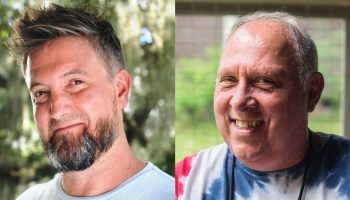With less than one-half of one percent of America’s population serving in the armed forces, it is easy for most people to go about their daily activities without thinking of those who are serving, who have served and the stories they may have.
“We think that there is a power in storytelling that is unique; stories have the power to connect, to reach across divides that separate one another, divides of neighborhood and income and experience and age,” said Tom DePastino, executive director of the Veterans Breakfast Club. “Through stories you can connect with people.”
The Veterans Breakfast Club is a nonprofit that started in 2008 with the goal of bringing veterans and the public together, giving veterans the opportunity to share their stories. They hold nearly 65 events every year in over 30 different locations around Western Pennsylvania, with as many as 300 attendees per event.
From 8:30 to 10:30 a.m. Sunday, June 30 at the Chautauqua Women’s Club, the VBC will hold its first-ever New York State storytelling event. This event will be sponsored by Tim Steitz and emceed by Tom DePastino.
Steitz is a veteran of Desert Storm and Desert Shield who served from 1986 to 1994. He was also part of the military police unit stationed in Pittsburgh, which was activated for war from 1990 to 1991. Steitz currently volunteers with Semper Fi Odyssey, an organization that helps injured careered soldiers transition back into civilian life.
As a veteran and lifelong Chautauquan, Steitz thinks VBC Storytelling aligns with the Week Two theme, “Uncommon Ground: Communities Working Toward Solutions.”
“We want to bridge the gap between the veteran experiences and the community,” he said. “If folks are able to come, hear some of the stories and experience, maybe it helps to bridge the gap and give them a better understanding. Kind of demythify or eliminate some of those misunderstandings. That’s what I feel this week is about: creating a closer fabric within communities.”
Steitz believes Chautauquans are the perfect audience for the New York debut of VBC Storytelling.
“Chautauqua brings people from all over the country and all over the world,” he said. “I think if you are going to reach out and be able to share this information and message, this is a great place to do that.”
There is a community established through the stories the veterans tell. DePastino believes the community VBC creates will blend into the already-established community of Chautauqua.
“What (the VBC is) really about is listening; we are really about giving people the opportunity to share stories of their service and really know and trust that they are going to be sharing their stories, that are often pretty sensitive stories, to people who are truly listening,” DePastino said. “Listening with empathy. Listening with love, attention and care. I think that is what Chautauqua is really all about. It’s a community of listening.”
VBC and Chautauqua both aim to reach across the generational divide to connect with a wide age range of people through programming.
“The youngest attending veteran we have had was 23 years old and the oldest was 103 years old,” DePastino said. “I think there is a lot of commonality, a lot of brotherhood and sisterhood across the generations, but the differences are very interesting and telling.”
From a veteran viewpoint, Steitz believes multiple generations can benefit from listening to the different perspectives of veterans, both young and old; those who have served in various wars ranging from World War II, Korea War, Vietnam War through Afghanistan and Iraq.
“One of these that I went to, there was a woman there who was from Germany during World War II and she had married an American soldier and came to the U.S.,” Steitz said. “During the war, she was really part of the Nazi Youth. She relayed the experience, of when she was my son’s age, of the propaganda machine and what they understood and knew about America and American soldiers. It was so very different than our perspective and what the reality was, so it was interesting to hear from her perspective and to share that with the folks that were there.”
The VBC believes every veteran has a story, whether they served in combat or held a support position. Some of these stories are often never told before a VBC event.
“We often hear at our events that a husband and wife, or a father and daughter will walk out of our events and say, ‘Boy, I have never heard them tell that story, it’s great to hear them,’ and we realize it is hard for veterans sometimes to initiate that conversation,” DePastino said.
Both DePastino and Steitz encourage all, even those without a military connection, to come and listen to the stories these veterans have to share.




